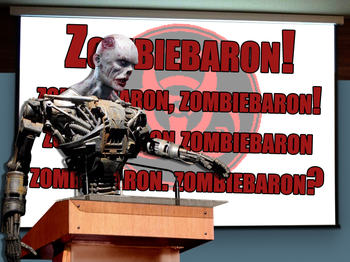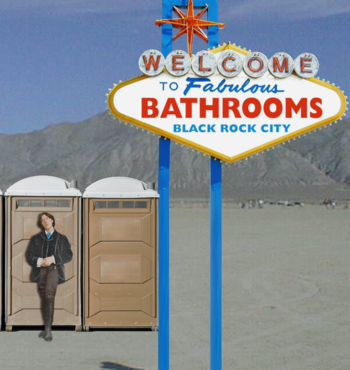User:Zombiebaron/Burning Man
This essay is a work in progress[edit | edit source]
This is an essay. It is not an ignorable policy on Uncyclopedia, so you should ignore it even more and disregard the mad ramblings of its writer. Or you could submit it as an Uncycloversity assignment in lieu of doing any actual work. |
| This page in a nutshell: Zombiebaron thinks we need a new set of guidelines that better reflect our community's ethos and culture. |
I think our community would benefit from codifying a set of principles similar to those of Burning Man, as a way of easily communicating to everyone involved, both new and old, what the values of our culture are. As I demonstrate below a lot of the principles of Burning Man lineup with existing values held by our community, however, with some notable exceptions, it is generally hard to find where these values are written down. Most of our existing policy pages are approaching 15 years old and desperately need updating. I am proposing that we write a new guidelines page that describes our cultural values. I believe that the culture of our community is very similar to the culture of Burning Man—both are collaborative artistic spaces celebrating free expression—so adapting their principles to our needs seems like a good place to start from.
What are the 10 Principles of Burning Man?[edit | edit source]
The Burning Man official website describes the principles as "guidelines [...] crafted not as a dictate of how people should be and act, but as a reflection of the community’s ethos and culture as it had organically developed since the event’s inception."
The 10 Principles of Burning Man[edit | edit source]
- Radical Inclusion
- Anyone may be a part of Burning Man. We welcome and respect the stranger. No prerequisites exist for participation in our community.
- From the perspective of editing Uncyclopedia, radical inclusion is how we treat our new users. In the past we have adopted policies that were not centered on being inclusive to new users, and this has resulted in less and less new users joining every year. I believe the best way forward is to adopt more inclusive behaviour. Streamlining the process of learning to edit would go a long way, so even somebody who has never contributed to a wiki before feels included.
Historically this principle has not been a part of the culture of our community, but in that I believe we have been gravely mistaken.
- Gifting
- Burning Man is devoted to acts of gift giving. The value of a gift is unconditional. Gifting does not contemplate a return or an exchange for something of equal value.
- From the perspective of editing Uncyclopedia, gifting can come in many shapes and forms. Every constructive edit is a gift: from spelling, grammar, and formatting fixes to whole added sentences, paragraphs, and images. Everything of value that we add to the wiki is given without contemplating a return or an exchange. Giving talkpage gifts was once a common practice in our community.
Historically this principle has always been a part of our culture.
- Decommodification
- In order to preserve the spirit of gifting, our community seeks to create social environments that are unmediated by commercial sponsorships, transactions, or advertising. We stand ready to protect our culture from such exploitation. We resist the substitution of consumption for participatory experience.
- I feel like Uncyclopedia does a better job of decommodification than Burning Man. Our community has always voted to keep our site free of advertising, and we undertook a massive amount of work to free ourselves from the yoke of Wikia's commercial sponsorship. Whereas it costs money to buy a ticket to Burning Man, access to Uncyclopedia always has been and always will be free.
Historically this principle has always been a part of our culture.
- Radical Self-reliance
- Burning Man encourages the individual to discover, exercise and rely on his or her inner resources.
- From the perspective of editing Uncyclopedia, I feel like radical self-reliance is somewhat self explanatory. Using a computer is ultimately a solitary activity, and for the most part it is possible to find the resources online to learn how to accomplish just about anything. Of course sometimes one must rely on their ability to ask others for help, but it is much easier to help somebody who has already attempted to help themselves.
Historically this principle has always been a part of our culture.
- Radical Self-expression
- Radical self-expression arises from the unique gifts of the individual. No one other than the individual or a collaborating group can determine its content. It is offered as a gift to others. In this spirit, the giver should respect the rights and liberties of the recipient.
- From the perspective of editing Uncyclopedia, radical self-expression is an affirmation that each contributor is unique, that their unique contributions to the community are all equally valid, and that contributions should be respectful.
Historically this principle has always been a part of our culture.
- Communal Effort
- Our community values creative cooperation and collaboration. We strive to produce, promote and protect social networks, public spaces, works of art, and methods of communication that support such interaction.
- From the perspective of editing Uncyclopedia, communal effort is an affirmation of the value we place in collaboration. Uncyclopedia is the sum of all our efforts.
Historically this principle has always been a part of our culture.
- Civic Responsibility
- We value civil society. Community members who organize events should assume responsibility for public welfare and endeavor to communicate civic responsibilities to participants. They must also assume responsibility for conducting events in accordance with local, state and federal laws.
- I looked up a definition of "civic responsibility": "Civic responsibility means active participation in the public life of a community in an informed, committed, and constructive manner, with a focus on the common good." From the perspective of editing Uncyclopedia, civic responsibility is participating in voting pages, discussion forums and Discord, and generating all manner of content for the wiki.
Historically this principle has always been a part of our culture.
- Leaving No Trace
- Our community respects the environment. We are committed to leaving no physical trace of our activities wherever we gather. We clean up after ourselves and endeavor, whenever possible, to leave such places in a better state than when we found them.
- This one is sort of hard to relate to Uncyclopedia since we have no effect on the environment. I think that leaving spaces in a better state then we found them is a good sentiment, and can be applied to editing a wiki.
I think this principle would need to be significantly reworded in order to be applicable to editing Uncyclopedia.
- Participation
- Our community is committed to a radically participatory ethic. We believe that transformative change, whether in the individual or in society, can occur only through the medium of deeply personal participation. We achieve being through doing. Everyone is invited to work. Everyone is invited to play. We make the world real through actions that open the heart.
- From the perspective of editing Uncyclopedia, participation is much the same as at Burning Man. The only way to truly experience the full value of Uncyclopedia is to participate in it.
Historically this principle has always been a part of our culture.
- Immediacy
- Immediate experience is, in many ways, the most important touchstone of value in our culture. We seek to overcome barriers that stand between us and a recognition of our inner selves, the reality of those around us, participation in society, and contact with a natural world exceeding human powers. No idea can substitute for this experience.
- From the perspective of editing Uncyclopedia, immediate experiences can be achieved in many ways. Editing pages on the wiki allows for an immediate experience. Conversing on discord with other community members allows for an immediate experience.
Historically this principle has always been a part of our culture.

